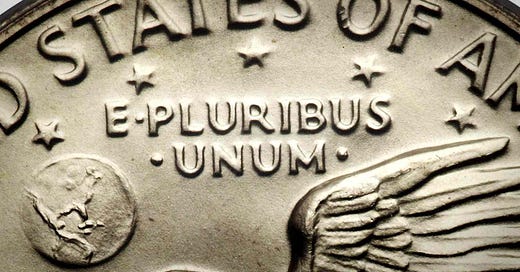Fr. Mike has said something (I can't find the video) like, "Catholicism isn't either/or; it's both/and." Today’s readings exemplify that. The world is divided, but Christ brings everyone together.
Reading 1
1 Cor 12:12-14, 27-31a
Brothers and sisters: As a body is one though it has many parts, and all the parts of the body, though many, are one body, so also Christ. For in one Spirit we were all baptized into one Body, whether Jews or Greeks, slaves or free persons, and we were all given to drink of one Spirit.
Now the body is not a single part, but many.
Now you are Christ's Body, and individually parts of it. Some people God has designated in the Church to be, first, Apostles; second, prophets; third, teachers; then, mighty deeds; then gifts of healing, assistance, administration, and varieties of tongues. Are all Apostles? Are all prophets? Are all teachers? Do all work mighty deeds? Do all have gifts of healing? Do all speak in tongues? Do all interpret? Strive eagerly for the greatest spiritual gifts.
We are individuals. We have a personal relationship with our creator, who made each one of us because he loves us specifically and uniquely.
But we are also part of something bigger than ourselves—the Church. We are members of a community, we participate in communal worship.
These aren't contradictions or paradoxes. Both are true: we're individuals and part of a community.
Responsorial Psalm
Ps 100:1b-2, 3, 4, 5
R. (3) We are his people: the sheep of his flock.
Sing joyfully to the LORD, all you lands;
serve the LORD with gladness;
come before him with joyful song.
R. We are his people: the sheep of his flock.
Know that the LORD is God;
he made us, his we are;
his people, the flock he tends.
R. We are his people: the sheep of his flock.
Enter his gates with thanksgiving,
his courts with praise;
Give thanks to him; bless his name.
R. We are his people: the sheep of his flock.
For he is good, the LORD,
whose kindness endures forever,
and his faithfulness, to all generations.
R. We are his people: the sheep of his flock.
As with above, the world is composed of many nations, many peoples. They're all unique, and bring something special to the community of nations.
But we're also all one world, under God. No matter where we're from, God welcomes us.
Alleluia
Lk 7:16
R. Alleluia, alleluia.
A great prophet has arisen in our midst
and God has visited his people.
R. Alleluia, alleluia.
The people actually recognize Jesus,1 which is nice, because that doesn’t always happen.
Gospel
Lk 7:11-17
Jesus journeyed to a city called Nain, and his disciples and a large crowd accompanied him. As he drew near to the gate of the city, a man who had died was being carried out, the only son of his mother, and she was a widow. A large crowd from the city was with her. When the Lord saw her, he was moved with pity for her and said to her, “Do not weep.”
He stepped forward and touched the coffin; at this the bearers halted, and he said, “Young man, I tell you, arise!”
The dead man sat up and began to speak, and Jesus gave him to his mother. Fear seized them all, and they glorified God, exclaiming, “A great prophet has arisen in our midst,” and “God has visited his people.” This report about him spread through the whole of Judea and in all the surrounding region.
This miracle is reminiscent of Elijah’s resurrecting the only son of a widow at Zarephath,2 which is why the Jews, familiar with the story, recognize Jesus as a prophet. This continues the theme of universalism.
Yesterday,3 Jesus healed the servant of a Roman centurion, a foreign oppressor. Today, he heals the son of a Jewish widow, someone at the very bottom of society. Jesus doesn’t care how society views you; He sees you with God’s eyes—love.
Not fully, of course, because that hasn’t been revealed yet.



